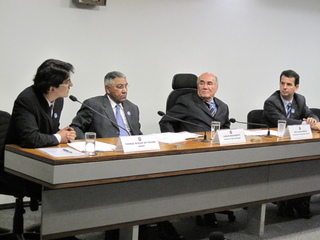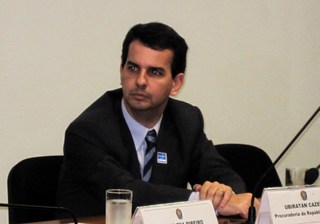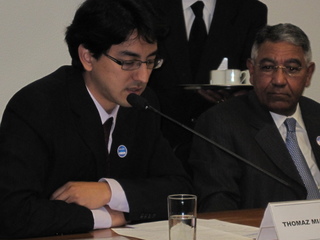Norte Energia refuses answers on Belo Monte in Senate hearing
In a public Senate hearing, President of Norte Energia CA refuses to respond to questions related to compliance with conditions linked to issuing of Installation License, by IBAMA, for Belo Monte
By Paul Wolters
 The public hearing, held in the Senate on Tuesday, December 7, was scheduled by the Senate Subcommittee assigned to oversee of the process leading to construction of the Belo Monte hydroelectric dam on the Xingu river. Even the chairman, Senator Flexa Ribeiro, of the PSDB of Pará, acknowledged the lack of response by Carlos Nascimento, president of Norte Energia CA, the company that plans to build Belo Monte. "Much was said and nothing was told", he concluded after the first answer to the question of whether the company can meet the conditions and when. Nascimento simply did not answer any of the questions posed by the president, IBAMA, or the MPF. "I am more confused now by the answer," Ribeiro concluded three times during the hearing.
The public hearing, held in the Senate on Tuesday, December 7, was scheduled by the Senate Subcommittee assigned to oversee of the process leading to construction of the Belo Monte hydroelectric dam on the Xingu river. Even the chairman, Senator Flexa Ribeiro, of the PSDB of Pará, acknowledged the lack of response by Carlos Nascimento, president of Norte Energia CA, the company that plans to build Belo Monte. "Much was said and nothing was told", he concluded after the first answer to the question of whether the company can meet the conditions and when. Nascimento simply did not answer any of the questions posed by the president, IBAMA, or the MPF. "I am more confused now by the answer," Ribeiro concluded three times during the hearing.
Ribeiro’s comment was surprising, since the subcommittee he´s chairing is not trying to questioned the construction of Belo Monte, its economic and socio-environmental viability, nor its necessity. A serious flaw. Quite the contrary: as the name indicates, the subcommittee only "follows the work on Belo Monte”, taking the construction as a given.
Malaria
 In an impromptu attempt to evase the questions, Nascimento embarked in long and chaotic discourses, ending up telling a cache of absurdities. He ended up saying that there are no negative references about the Balbina hydroelectric dam. He argued that outbreaks of contagious diseases such as malaria in the region of Tucurui[1], were caused by improper clearing by the resettled families, as this would have removed the birds that eat the insects that transmit the disease. He argued that these two plants (Tucurui and Balbina) are well succeeded examples of social and environmental mitigation, including the impacts on the indigenous peoples affected. Finally he said that Belo Monte will not impact the indigenous peoples (sic).
In an impromptu attempt to evase the questions, Nascimento embarked in long and chaotic discourses, ending up telling a cache of absurdities. He ended up saying that there are no negative references about the Balbina hydroelectric dam. He argued that outbreaks of contagious diseases such as malaria in the region of Tucurui[1], were caused by improper clearing by the resettled families, as this would have removed the birds that eat the insects that transmit the disease. He argued that these two plants (Tucurui and Balbina) are well succeeded examples of social and environmental mitigation, including the impacts on the indigenous peoples affected. Finally he said that Belo Monte will not impact the indigenous peoples (sic).
The chief prosecutor of the Ministério Público Federal of Pará, Ubiratan Cazetta retorted indignantly. "I cannot accept statements that the hydroelectric dam will not impact indigenous lands. Yes , for sure it will impact them! The communities of Big Bend live on the banks of the river, and 80% of the water of the Xingu river will be diverted if the plant is built. How can one possibly conclude that they will not be impacted!" He questioned the construction of Belo Monte itself and the alleged necessity of the plant. "I can´t hear this discourse on ‘lost opportunities’ any longer and ‘we need the energy of the Belo Monte’. There are several other alternatives to Belo Monte!" He mentioned various alternatives, like investments in energy efficiency, re-powering existing hydroelectric plants and solar energy. These alternatives are, however, being totally ignored by the Brazilian government.
Unacceptable
At various times Cazetta was angered by the "non-answers"of Nascimento. Repeatedly seeking an answer to the central question of the hearing: Norte Energia does or does not have an elaborate and detailed plan for fulfillment of the forty conditions for the project? To each question, Nascimento evaded, saying that "the project is very big", that "the financing is very complicated," that "the conditions require much investment."
Given the evasive attitude of the president of Norte Energia, Ubiratan was emphatic: "The companies knew all of this when they entered the bidding. No company embarks on this type of enterprise without a plan! It alarms me that even the realisation of the conditions are being cast into the future. Today there is no plan, no resources for fulfilling the conditions. This is unacceptable for such a project!" He reasoned that the plan must be detailed: "When will the conditions be met, where resources will be coming from, who will pay maintenance after the realisation of the conditions. Because it is easy to construct, but difficult to maintain. For example, it is easy to build a hospital in Vitória do Xingu. But it is difficult to find doctors willing to work there, they refuse to live there. How are you going to solve this problem? ".
Partial Installation License
However, not even a hypothetical "very tangible executive plan" would solve another problem. The issuance of a Partial Construction License , which the consortium is requesting for it to start installation of the construction site. "In the opinion of the Federal Public Ministery (MPF) there does not exist a Partial or fractional License for Installation in Brazilian legislation. What occurred in the Madeira River case [with the Jirau and San Antonio plants], should not have happened and should not happen with Belo Monte.”
 The representative of IBAMA in the meeting, Thomas Miazak of Toledo, of the Office of Licensing of IBAMA, avoided to specify the position of this state organ on the matter. He explained that the legal department would study, together with the Attorney General’s Office, the opinion of the MPF. But he suggested that IBAMA could, once again, not heed the request of the MPF.
The representative of IBAMA in the meeting, Thomas Miazak of Toledo, of the Office of Licensing of IBAMA, avoided to specify the position of this state organ on the matter. He explained that the legal department would study, together with the Attorney General’s Office, the opinion of the MPF. But he suggested that IBAMA could, once again, not heed the request of the MPF.

[1] See CIMI report on Violence Against Indigenous Peoples 2008 – Health p.108- cases recorded by state
https://cimi.org.br/?system=news&action=read&id=4194&eid=397

